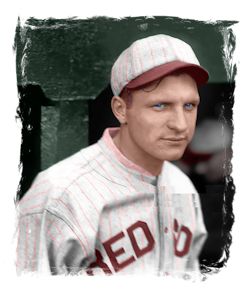 |
Billy Rogell was born on November 24, 1904, in Springfield, Illinois. His family eventually settled in Assumption, a mining town in southern Illinois. He attended Fenger High School while working as an office boy for the Pullman Car Company, and played baseball for St. Anthony in the Roseland Catholic Church League, where he was a standout second baseman. His level of play landed him on the Pullman Athletic Club semipro team in 1922. That team had a number of standout players, including two from the former Federal League. They recommended Billy to contacts in the minor leagues and he eventually ended up playing for Coffeyville, Kansas, in the Southwestern League. In 1924 Billy was asked to join the Salina, Kansas squad and had a stellar year for the Salina Millers that year, hitting .317. He played an exceptional second base and caught the eye of the Boston Red Sox, who signed him during the offseason. With only Class C experience, he made the Red Sox, debuting in April 1925, at the age of 20. He hit only .195 in 169 at-bats. He spent the 1926 season with the Jersey City Skeeters in the International League, with limited playing time, appearing in only 33 games, but he found himself back with the Sox in 1927. He hit .266 in 207 at-bats, but the next year, his batting average dropped to .233, and after the season he was released. In 1929, Billy was traded to the St. Paul Saints of the American Association. The 1930 season started slowly for him, appearing in 54 games for the Detroit Tigers, batting a paltry .167 and eventually was sent to Toronto of the International League. He improved on his performance in 1931, and the Tigers bought his contract from Toronto for $10,000. Billy rewarded the their faith in him by hitting .303 in the last 48 games of the season, and his hold on the shortstop position lasted for the next eight years. Billy was a tenacious and aggressive player in the middle of the field. He was known as one of the best shortstops during his era, blessed with great range and a strong throwing arm. He led the league in fielding percentage for three straight years, from 1935 through 1937, and in assists in 1934. He and Charlie Gehringer were near the top of the American League in double plays during their tenure together. During the 1938 offseason, Billy injured his throwing arm while playing handball, and the strength he was known for failed to return. He finished with a batting average of .274 during his time with the Tigers. By the end of the 1939 season, Billy had lost his starting job, and during the winter was dealt to the Chicago Cubs. His time with the Cubs was a disaster from the start. He spent most of the year riding the bench, appearing in just 33 games and hitting a paltry .136, before being given his release in August 1940. He quickly latched on with the Montreal Royals of the International League, who signed him for their stretch run. Billy was hired to be player-manager for the Lancaster Red Roses of the Interstate League in 1941, but broke his shoulder in an automobile accident before the start of the season, and couldn’t play for most of the year. His frustration with the poor quality of his players, most of them fresh out of high school and unable to handle the level of competition, led him to hang up his spikes before the end of the year. A Detroit resident, Billy ran for the City Council, and was elected, beginning a nearly 40-year association with the city’s governing body. He was respected by many during his tenure on the City Council, despite his gruff demeanor. He served on a number of committees responsible for building and highway projects in the city, and always had the needs of the community first. One of his first projects was developing a baseball school program for the boys of Detroit. The program started with 296 teams in 1942 and grew to over 800 by 1954. He also was known to assist any old ballplayer who was down on his luck. He always made sure that a bed was available, an interview for a job scheduled, or money provided for a meal or travel. Billy retired from the City Council in 1981, and spent the rest of his life residing in Detroit and Florida. In September, 1999, he was given the honor of throwing out the ceremonial first pitch before the final game at Tiger Stadium. Billy Rogell died of pneumonia in Warren, Michigan, on August 9, 2003, at the age of 98. |
|||||
